
Milestone 7: Market Potential of NBS and structuring the impact of Nature-Based Enterprises
Assessing the market potential of NBS
Since 2018, a dedicated Work Package (team) within URBiNAT has focused on assessing the market potential of NBS. This has involved identifying and collecting data from enterprises, including start-ups, cooperatives and non-profit organisations, that are involved in the development and commercial exploitation of NBS (Nature-Based Enterprises).
URBiNAT researchers have used different indicators and matrices to assess the market potential for different NBS solutions some of which can be seen below. This work had directly fed into high-level policy recommendations focused on how to replicate and scale best practice NBS business cases.
In due course, URBiNAT partners and interested third parties will be given access to a report on the market potential of the URBiNAT NBS catalogue.
Valuing Nature-Based Solutions
What is a Nature Based Solution?
The European Commission defines Nature-Based Solutions (NBS) as “Solutions that are inspired and supported by nature, which are cost-effective, simultaneously provide environmental, social and economic benefits and help build resilience. Such solutions bring more, and more diverse, nature and natural features and processes into cities, landscapes and seascapes, through locally adapted, resource-efficient and systemic interventions. As such Nature-based Solutions must therefore benefit biodiversity and support the delivery of a range of ecosystem services. Read more HERE
Since 2018 the URBiNAT project has used an expanded definition of NBS. This consists, notably, of a four-part categorisation of NBS as Technical, Territorial, Participatory and Social & Solidarity Economy Nature-Based Solutions. More about the URBiNAT NBS Catalogue HERE
Capturing the social, economic and environmental value of NBS
The capacity to benefit from value generated by NBS through market transactions or policy instruments is defined as “value capture”. Based on economic theory on the classification of goods (Ostrom, 1990) four categories of goods can be individuated: private goods, public goods, toll goods and common pool resources.

Flow of Natural Capital via NBS. Adapted from Capitals Coalition and We Value Nature
What is a Nature-Based Enterprise (NBE)?
NBEs are enterprises that use nature either directly, or indirectly as a source of value-creation, while also independent entities that innovate around, synthesise and process benefits of NBS so that these become visible and translate into value that can be internalised and captured by market actors.
From Nature-Based Solutions to a Nature-Based Economy
The Market for Nature-Based Solutions
Since 2018, URBiNAT researchers have conducted research market for NBS including key challenges and enablers to market development. They have considered the market forces of supply and demand. The concept of nature-based enterprises (NBEs) has been identified as a key enabler of market supply to meet increasing market demand and provide additional vehicles for private sector investment.
Draft White Paper (2021)
NBS present many challenges for traditional policy-making in relation to demand. The extent to which there is demand for, e.g., the public space, amenities, climate mitigation & adaptation, support of wellness, or other kinds of functionality generated by NBS, is a complex and insufficiently explored subject.
Understanding the demand for Nature-Based Solutions
The recommendations of this White Paper provide a basis for dialogue with policy makers, at all levels of government and across all fields of policy implementation, and with wider stakeholders in business, society and the innovation ecosystem on the changes needed to shift towards a Nature-based Economy. It particularly aims at stimulating valuable cross-sectoral policy discussions between policy makers responsible for climate change and biodiversity policy and those responsible for sustainable economic growth policies within the context of rapidly depleting stocks of natural capital.
Yet, the outcome is bound to have a strong bearing on the willingness of policy makers, market actors and civil society to invest in and develop NBS. It is also interwoven with the degree to which NBS are put to use and accompanied by innovation and the rise of commercial enterprises capable of sustainable business operations, or able to sustain social innovations and not-for-profit activities in support of wider social goods.

Related URBiNAT Resources
[White Paper] From Nature-Based Solutions to the Nature-Based Economy
Author(s): McQuaid, Siobhán; Rhodes, Mary-Lee; Andersson, Thomas; Croci, Edoardo; Feichtinger-Hofer, Marianne; Grosjean, Matthieu; Lueck, Alina; Kooijman, Esmee; Lucchitta, Benedetta; Rizzi, Daniela; Reil, Alice; Schante, Joanne
Published in: From Nature-based Solutions to the Nature-based Economy - Delivering the Green Deal for Europe. Draft White Paper for consultation. Nature-based Economy Working Group of EC Task Force III on Nature-based Solutions, 2021
Publisher: NA
DOI: 10.5281/zenodo.5055605
----------------
Decades of research and more recently public policy recognise that current economic practices are not compatible with a healthy planet. The European Green Deal aims to decouple economic growth from resource usage, decarbonise industry and do this in a fair and just way for society. Nature-based solutions (NBS) to address societal challenges have been identified as an important policy instrument to achieve the aspirations of the European Green Deal and other key policy objectives such as those set out in the EU Biodiversity for 2030 Strategy and the ambitions of “building back better” from the impact of COVID-19 in the EU Recovery plan. The European Commission identifies nature-based solutions (NBS) as those solutions to societal challenges that are “inspired and supported by nature, which are cost-effective, simultaneously provide environmental, social and economic benefits and help build resilience. Such solutions bring more, and more diverse, nature and natural features and processes into cities, landscapes and seascapes, through locally adapted, resource-efficient and systemic interventions” (Faivre et al., 2017). Nature-based solutions provide multiple benefits for biodiversity. While much focus to date has been on the environmental or social benefits of NBS, less attention has been paid to their economic potential and their role in a just transition to the type of sustainable economy envisaged in the European Green Deal.
Video test
Video test
High-level presentations
[VIDEO] UN Habitat Roundable. "Nature Based Solutions to a Nature-Based Economy" (Oct. 2022)
There is no future for “business as usual”. Systemic transformation is needed to shift towards an economy where economic growth is decoupled from resource usage, industry is decarbonised and climate neutral and all members of society are engaged in this transition in a fair and equitable way. To achieve this systematic transformation, disruptive change is required. The role of nature-based solutions (NBS) in societal transformation have been increasingly recognised in European and international frameworks. While much focus has been on the environmental or social benefits of NBS, less attention has been paid to their economic potential and their role in a just transition to a sustainable economy.
During this session, four distinguished economists, including URBiNAT’s Pr. Thomas Andersson (IKED, Sweden) discussed the relevance of the concept of a nature-based economy and identified conceptual and practical challenges and priority areas for further research and innovation.
Watch video HERE
[VIDEO] COP27 - A nature positive economy for climate and biodiversity benefits (Nov. 2022)
[PRESENTATION] In this session, businesses, researchers, and policy makers consider the evidence, best practices, tools, and strategies in support of a nature-positive economy. The benefits for biodiversity, ecosystems, and climate are highlighted.
Although many are committed to adopting nature-positive practices, hindrances prevail and clarity on the way forward is often lacking.
We examine the driving forces for a nature-based economy, showcase success stories and draw lessons what can be achieved going forward.
View video HERE
As part of the URBiNAT project teams on the ground in Frontrunner and Follower cities have been looking into ways in the the Social and Solidarity Economy (SSE) can ben leveraged to unlock the potential of NBS. From Porto to Nantes, Sofia, and around the world, the SSE refers to a diverse range of economic activities that prioritize social and environmental objectives over profit, and that aim to promote the well-being and empowerment of individuals and communities.
The SSE includes a wide range of economic actors, such as cooperatives, mutuals, social enterprises, and non-profit organizations, as well as alternative economic practices, such as fair trade, community-supported agriculture, and time banks, all of which are active in some form or another in our Frontrunner and Follower cities. These actors and practices often operate outside of the traditional market economy and seek to challenge dominant economic models and practices that prioritize profit over social and environmental concerns.
The SSE is often viewed as an alternative to traditional capitalism and a way to address social and environmental issues in a more equitable and sustainable way. Yet, what we have seen in practice, in our URBiNAT cities, is that the two models can co-exist. The Solilab in Nantes and the XXX in Porto exemplify how cities are looking to the SSE in the process of building more inclusive, resilient, and sustainable economies.
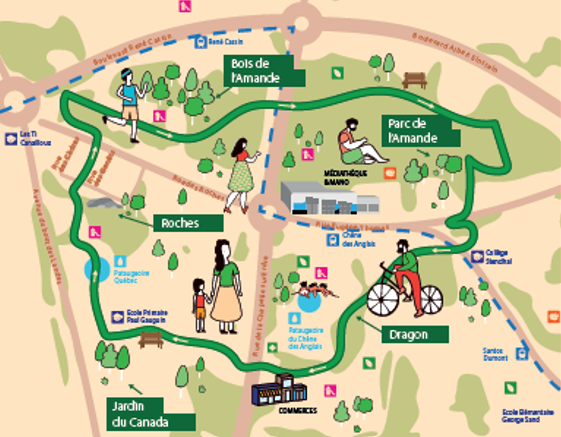
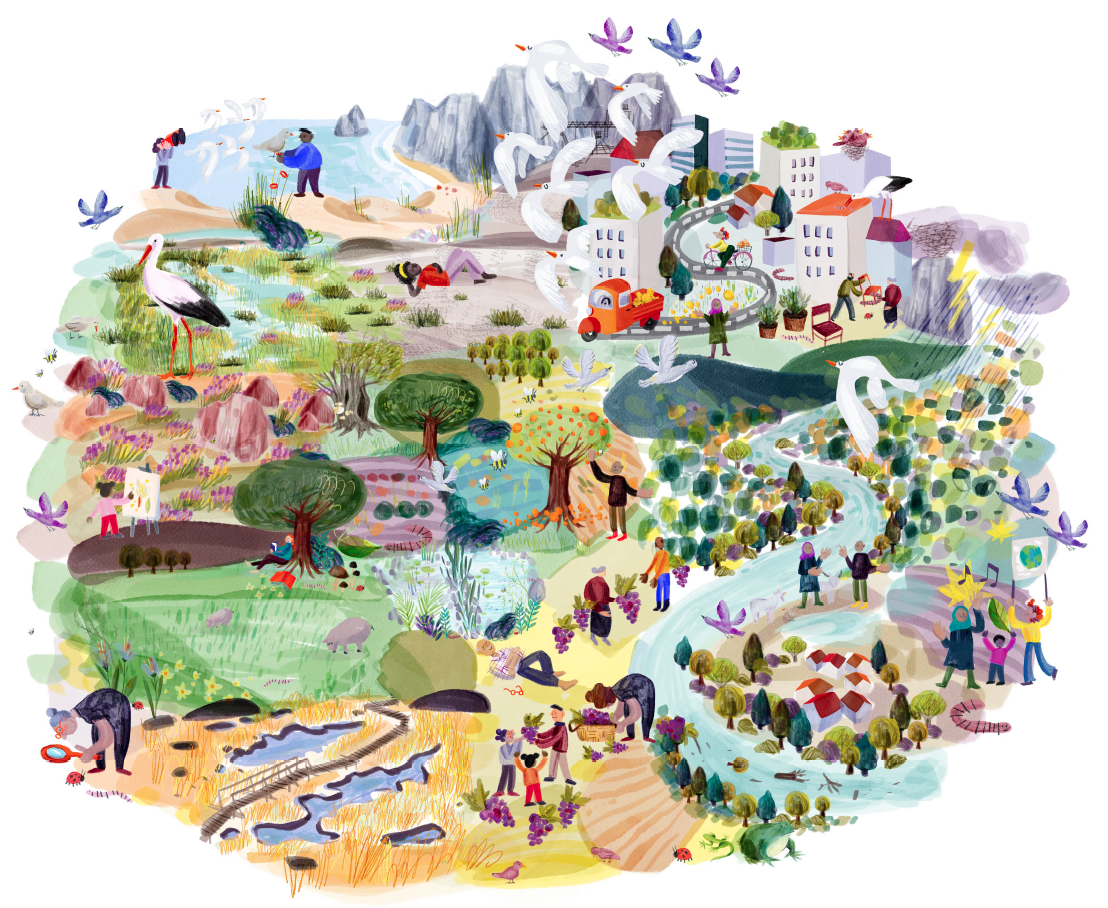
The social and solidarity economy (SSE) can play a vital role in unlocking the potential of NBS in cities in a number of ways. For example, SSE actors, such as social enterprises or cooperatives, e.g. the Bread Houses in Sofia, or the Farmer’s Markets in Porto, may be involved in the design, implementation, and management of NBS projects. They may also be involved in education and outreach efforts to promote the benefits and value of NBS to urban communities.
In addition, the principles of the SSE, such as community participation, collaboration, and sustainability, are very much at the heart of the co-creation practices we have sought to put in place as part of the project. These can be applied to the development and governance of NBS initiatives, to ensure that they are developed in a way that is inclusive, equitable, and responsive to the needs and aspirations of local communities.
Overall, the SSE can be a valuable partner in promoting and supporting the development of NBS in cities, helping to ensure that they are developed and managed in a way that benefits both the environment and the communities that depend on them.
Nature Based Enterprises
In this section we present four categories of Nature-Based Enterprise corresponding to the four cateogories of NBS in as defined by the URBiNAT project.
For each category of Nature-Based Enterprise we have selected three representative enterprises from URBiNAT Frontrunner Cities. Click on each NBE Card for more details.



Technological NBE
A technological NBE is an enterprise or organisation that makes use of technical solutions and means as a core part of its value proposition relating to Nature, including by synthesising and processing benefits of NBS.
Featured Nature-Based Enterprises & Organisations
Territorial NBE
A territorial NBE is as an enterprise or organisation that draws on spatial solutions as a core part of its value proposition relating to Nature, including by synthesising and processing benefits of NBS.
Featured Nature-Based Enterprises & Organisations
Participatory NBE
A participatory NBE is an enterprise or organisation that engages people using participatory methods as a core part of its value proposition relating to Nature, including by synthesising and processing benefits of NBS.
Featured Nature-Based Enterprises & Organisations
Social & Solidarity Economy NBE
A social and solidarity NBE is an enterprise or organisation that propels voluntary and sharing economy methods as a core part of its value proposition relating to Nature, including by synthesising and processing benefits of NBS.
Featured Nature-Based Enterprises & Organisations
Matrix: Structuring the impact of NBEs
Typologies of NBEs
In this table ➡️ we present examples of NBEs in each Frontrunner city corresponding to the four categories of NBS used by the URBiNAT project.
In each Frontrunner city we have identified examples of economically viable NBEs delivering high value social and environmental services.
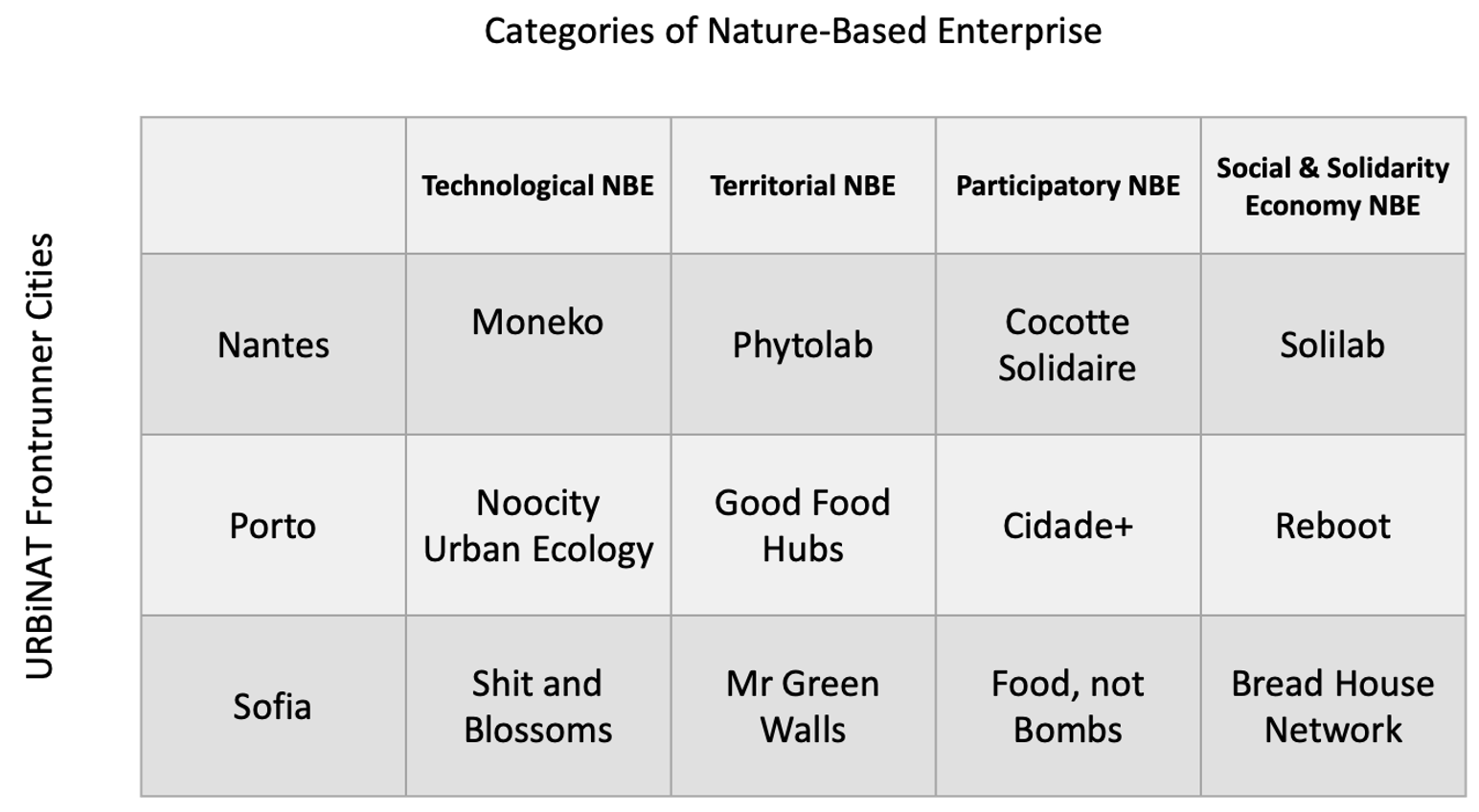
Matrix mapping NBEs against NBS, URBiNAT frontrunner cities (Source: IKED & ITEMS, 2022)
Clusters of NBEs
In practice, NBEs may not relate to specific categories of NBS, but their orientation and mechanisms for value-creation may relate to a combination of several NBS, or NBS categories.
The figure ⬇️ maps the estimated position of each of the selected NBEs in a scatter diagram that allows for combinations of NBS types.
This results in indications of “clusters”. What we observe is one cluster combining Participatory and Social and Solidarity Economy” NBS, and a second combining Technology and Territorial, with some variation which of these dimensions weigh most heavily.
All three URBiNAT frontrunner cities present NBEs that populate all these categories. The leading NBEs from Sofia are somewhat stronger linked to technological NBS however, with Nantes and Porto lean more towards participation and the social dimension.
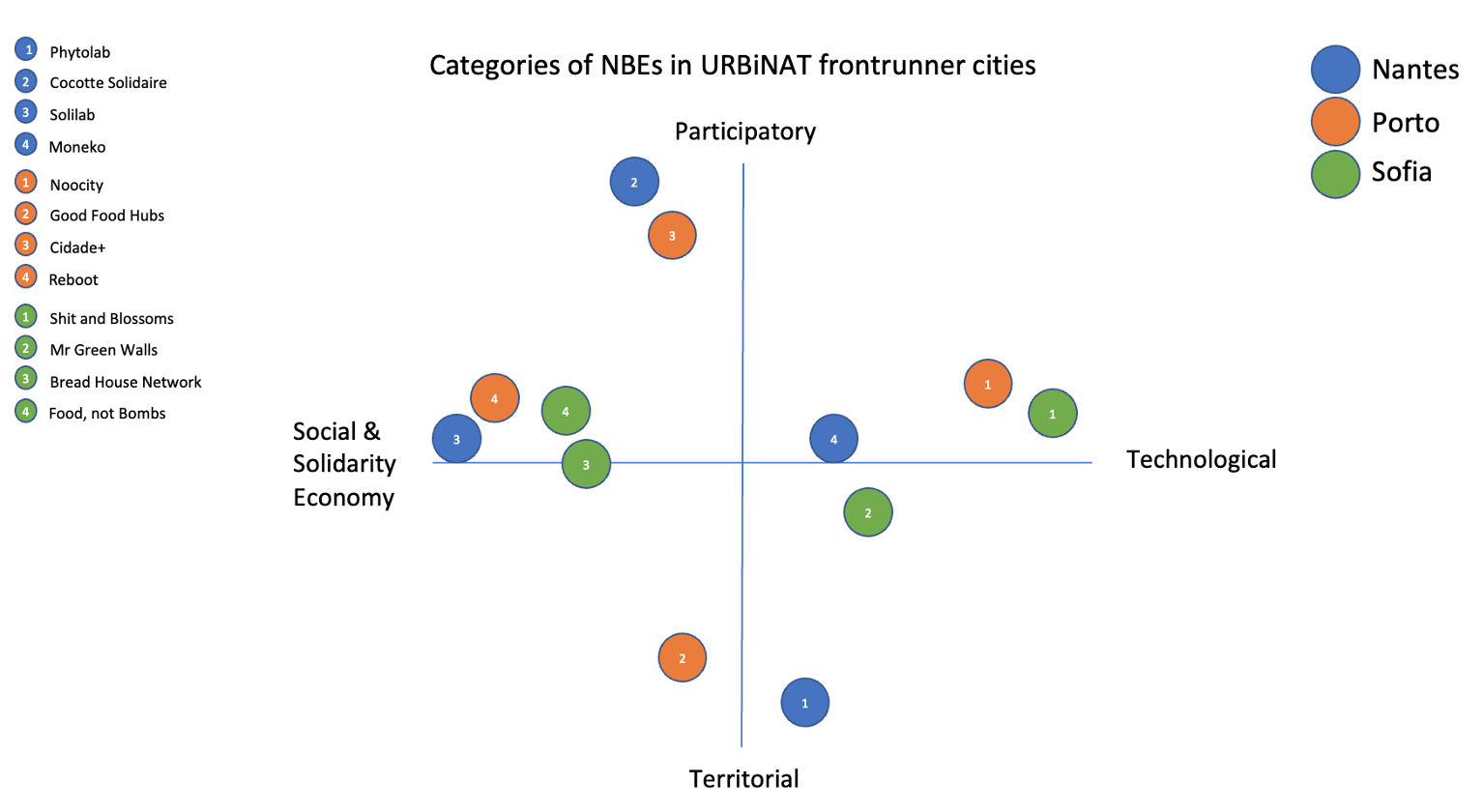
Scatter diagram, NBEs scattered against NBS (Source: IKED & ITEMS, 2022)
Enabling Environment
The figure ➡️ presents a stylised illustration of selected framework conditions for NBEs, in this case a tentative assessment of their relative standing in each of URBiNAT’s frontrunner cities. The further out from the centre, the stronger a particular city scores in a certain aspect. On this basis, Nantes is depicted as offering the most favourable conditions for NBEs overall, although Porto is shown to do better on conditions for start-ups and also public investment. Sofia is generally in a less favourable situation, except for digital services and partly R&D (including technical skills). It should be underlined, however, that the ranking indicated here does not reflect the results of a thorough or statistically verified estimation. The figure rather aims to call attention to the importance for each city to identify key factors influencing conditions for NBEs, while also examining their strengths and weaknesses in those respects, for the purpose of building on the former as well as – if possible – correcting the latter.
In the continued work, examing the degree which follower cities can learn from and adopt the experience of NBEs in the frontrunner cities, carrying out such analysis for each the relevant followers will be of high importance.
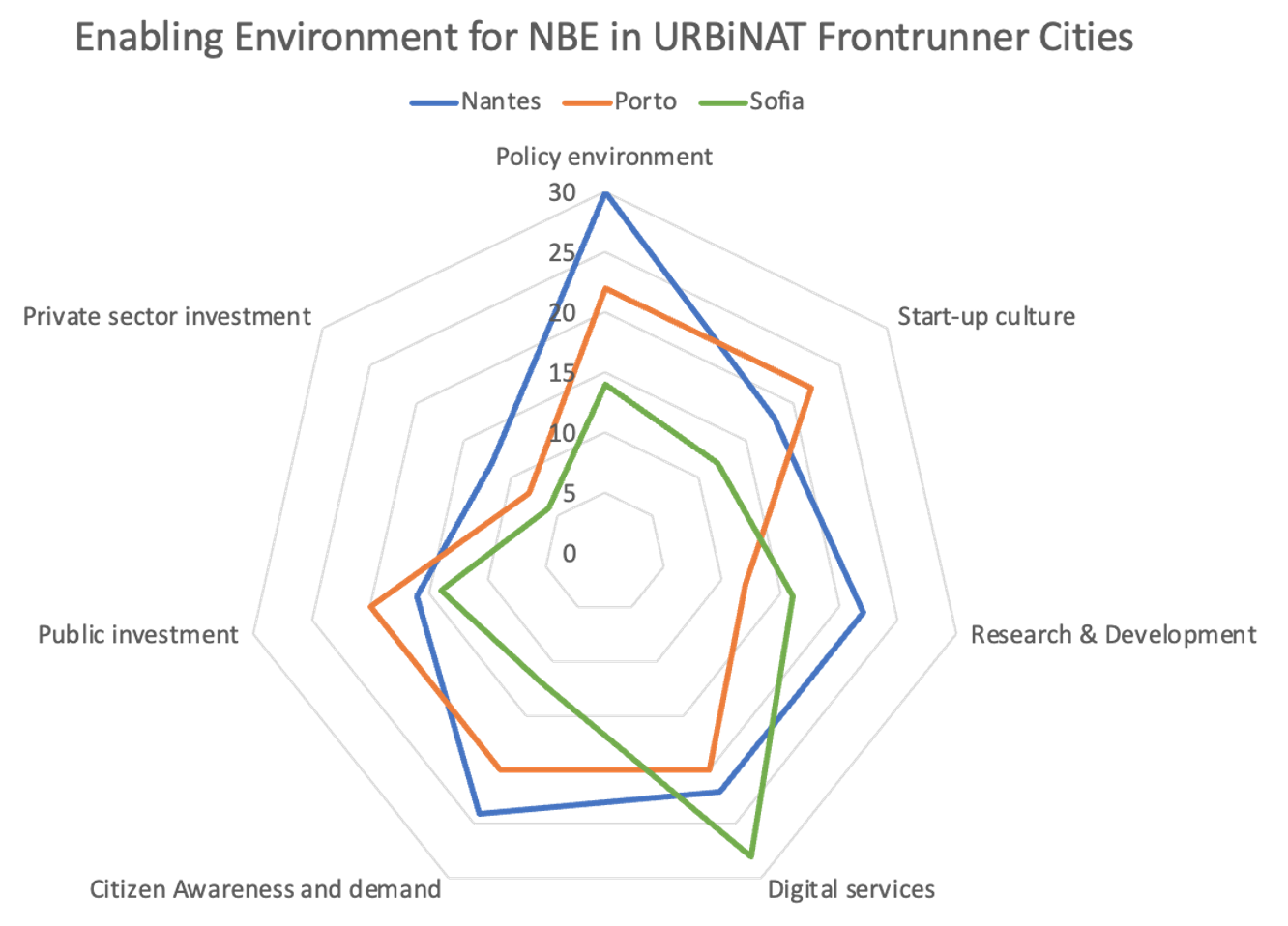
External factors framing conditions for NBEs (Source: IKED & ITEMS, 2022)

-
1
Access to natural resources
Nature-based enterprises rely on the use of natural resources, such as forests, water, or wildlife, in a sustainable manner. Therefore, it is important for these enterprises to have access to these resources and to be able to use them in a way that does not damage the environment or compromise the long-term sustainability of the resource.
-
2
Clear legal and regulatory frameworks
Nature-based enterprises need to operate within a clear legal and regulatory framework that defines the rights and responsibilities of different stakeholders, such as the enterprise, the local community, and the government. This framework should provide a balanced approach that allows the enterprise to operate sustainably and generate benefits for all parties, while also protecting the environment and the rights of local communities.
-
3
Supportive policies and incentives
Governments and other stakeholders can support the success of nature-based enterprises through the development of policies and incentives that promote the use of natural resources in a sustainable manner. These can include financial incentives, such as grants or subsidies, or regulatory incentives, such as simplifying the permitting process for sustainable projects.
-
4
Capacity building and technical support
Nature-based enterprises often require specialized knowledge and skills to operate sustainably and effectively. Therefore, it is important for these enterprises to have access to capacity building and technical support, such as training programs, technical assistance, or networking opportunities, to help them develop the skills and knowledge they need to succeed.
-
5
Market opportunities and demand
Nature-based enterprises need to be able to sell their products or services in order to generate income and be financially viable. Therefore, it is important for these enterprises to have access to market opportunities and to be able to meet the demand for their products or services. This may require the development of marketing and sales strategies, or the identification of potential partners or customers.
-
6
Collaboration and partnerships
Successful nature-based enterprises often rely on collaboration and partnerships with other stakeholders, such as local communities, governments, or other businesses. These partnerships can provide access to resources, knowledge, and expertise, and can help to build trust and support for the enterprise. Therefore, it is important for nature-based enterprises to develop and maintain strong partnerships with a range of stakeholders.
Indicator of comparative Social, Environmental and Economic impact
There are a variety of ways to measure the impact of NBS in urban environments. One approach is to use quantitative metrics, such as monitoring changes in air and water quality, or measuring the amount of carbon sequestration provided by trees and plants.
Another is to use qualitative metrics, such as surveying residents to assess their perceptions of the benefits of NBS, or conducting case studies to evaluate the specific benefits provided by NBS in a particular location.
Measuring the economic benefits of NBS is challenging, as benefits are diverse and not always readily quantifiable. However, there are tried-and-tested models, as well as new developments in economic valuation that provide urban planners and policy makers with the means to express the opportunity costs and more subtle benefits to society resulting from the implementation of NBS.
These include:
- Cost-benefit analysis: This approach involves comparing the costs of implementing an NBS with the social, environmental and economic benefits it is expected to generate. This can help to determine whether an NBS is a cost-effective solution.
- Economic valuation: This approach involves estimating the monetary value of the benefits generated by an NBS. This can include the value of the natural resources and ecosystem services provided by the NBS, as well as the value of any economic opportunities it creates.
- Contingent valuation: This approach involves asking people how much they would be willing to pay for a particular NBS. This can help to estimate the value people place on the benefits provided by an NBS.Overall, measuring the economic benefits of NBS can be a complex process, and it may be necessary to use a combination of these approaches in order to capture the full range of benefits. It is important to carefully consider the specific context and objectives of an NBS when measuring its economic benefits.
The figure below is based on a matrix that has been developed as part of the URBiNAT project. This features the categories of NBE classified in accordance with the four categories of NBS.
The impacts are divided into economic, environmental and social. Each of the underlying NBE case studies are summarised below.
URBiNAT Wheel of NBEs

NBE Matrix (Source: ITEMS, IKED, 2022)
Technological NBS
Noocity (Porto 🇵🇹)
Environmental impact ? : Reduction of waste water. Contributing to the spatial quality of urban areas through its self-watering vegetable boxes
Economic impact ?: For-profit SME that provides work to a handful of people. Economic benefits from resource reuse and reduced waste
Social impact ?: Connecting people and nature. Connecting people through team building exercises
Moneko (Nantes 🇫🇷)
Environmental impact ? : By connecting supply and demand for sustainable products by a local currency, environmental benefits from reduced transport and pollution
Economic impact ?: Reduced transaction costs in the local economy. Lowered costs for local suppliers, enabling improved access to products and services for local clients, indirectly boosting growth and employment
Social impact ?: Builds local resilience and strengthens the local community, its networks and collaboration links
Shit and Blossoms (Sofia 🇧🇬)
Environmental impact ? : Through the reuse of organic waste products for fertilisation, the compost toilet is contributing to the reduction of wast
Economic impact ?: As the only non-plastic solution currently offered on the market, the compost toilet will be a competitor to the traditional toilets, reducing prices. Economic benefits from reduced waste. Economic benefits for low income groups attaining sanitary improvements at low cost
Social impact ?: Many countries have poor sanitary systems in place, especially in developing countries. Therefore, the compost toilet will have a positive impact on well-being and health in many communities where there is a lack of money and know-how to install traditional toilets. The compost toilet can be ordered online and easily self-installed for an affordable price
Social and Solidarity NBS
Solilab (Nantes 🇫🇷)
Environmental impact ? : Soil improvements, compost development, circularity (reduced waste), lowered energy costs, less pollution
Economic impact ?: Increased employment and SME development, especially NBEs resulting in positive externalities, higher efficiency and incomes locally
Social impact ?: Socially bonding meeting space for sharing experiences and connections, improved entrepreneurial opportunities and meaningful jobs for disadvantaged groups
Bread Houses (Sofia 🇧🇬)
Environmental impact ? : Impetus towards healthy eating and increased demand for eco-friendly ingredients and products
Economic impact ?: Expanded economic activity from events, birthdays, team building exercises, educational board games that are being sold are being used to pay employees, rent for the workshop place, and buying ingredients for the bread making
Social impact ?: Promotion of social inclusion through bread making events aimed at overcoming stereotypes. Improved informal and spontaneous networking. People with disabilities can meet volunteers, improve their social and manual skills, and feel accepted and respected. Awareness building of social problems, development of creative potential, and promotion of healthy eating and better health
Reboot (Porto 🇵🇹)
Environmental impact ? : Reducing non-renewable sources of material use and pollution
Economic impact ?: Improved supply of computer equipment to disadvantaged groups, reduced transaction costs, learning opportunities, countering inequalities
Social impact ?: Reduction of poverty among vulnerable socio-economically weak populations
Participatory NBS
Food, Not Bombs (Sofia 🇧🇬)
Environmental impact ? : Food education and supply for people in need
Economic impact ?: Improved access to food at low cost brings efficiency gains and economic benefits for the less well-off, reducing social costs
Social impact ?: Food education and supply for people in need
Cidade Mais (Porto 🇵🇹)
Environmental impact ? : Accompanying innovations and solutions related to water, energy and other environment- related topics. Promoting sustainable ways of living
Economic impact ?: Offers a specialised service and solution which has proven valuable through supplies to and collaboration with state-owned as well as private companies, benefitting the wider industry as well as customers
Social impact ?: Meeting point and platform where a diversity of actors from different parts of society can meet, interact and co-create on topics that relate to sustainability and social change
La Cocotte Solidaire (Nantes 🇫🇷)
Environmental impact ? : Locally sourced food and vegetarian meals reducing carbon emissions
Economic impact ?: Embedding circularity in the sourcing and cooking procedures raises efficiency and reduces waste. Training and skills development raise competencies, allowing for higher wages as well as increased employability
Social impact ?: New social interactions between different socio-economic groups in the vicinity
Territorial NBS
Good Food Hubs (Porto 🇵🇹)
Environmental impact ? : Contributing to a healthy food system and sustainable food production. Dealing with unnecessary waste
Economic impact ?: Lowering transaction costs by making supply chains more efficient and also less wasteful
Social impact ?: Bringing people together in workshops, events and activities centring on food, potentially improved health benefits
Mr Green Walls (Sofia 🇧🇬)
Environmental impact ? : Vertical gardens improve the microclimate, reduce the heat island effect, and reduce energy consumption
Economic impact ?: Vertical gardens improve the microclimate, reduce the heat island effect, and reduce energy consumption
Social impact ?: Vertical gardens improve interior microclimate, acoustics, and visual environment. They have a positive influence on mental health
Phytolab (Nantes 🇫🇷)
Environmental impact ? : Restoring ecosystems and improving biodiversity by connecting traditional landscaping methods with research in sustainability
Economic impact ?: Having a systemic approach in designing public spaces and embedding NBS supports local business growth
Social impact ? : Public space design aiming for inclusion and increased local content is improving interactions between citizens and accounts for a stronger community
Communities of Interest
URBiNAT communities of interest represent a vital aspect of URBiNAT’s vision for sustainable urban development. These communities are formed by nature-based enterprises operating within URBiNAT cities. They are enterprises that can serve as examples for the exchange of best practices and mutual learning. They have been assessed to have the potential to be scaled up and replicated in various urban contexts. Each enterprise embodies innovative and nature-centric approaches, leveraging the inherent benefits of green infrastructure,
biodiversity, and ecosystem services to enhance urban resilience, well-being, and sustainability. By nurturing these communities of interest, the URBiNAT project aims to foster knowledge exchange, collaboration, and capacity-building, enabling the dissemination and implementation of successful nature-based solutions across cities. Through this inclusive and participatory approach, URBiNAT communities of interest play a crucial role in shaping the future of sustainable urban development.









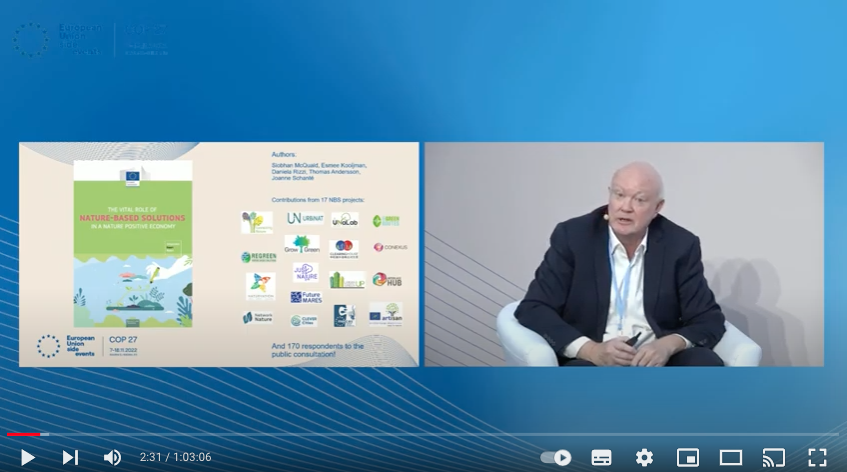


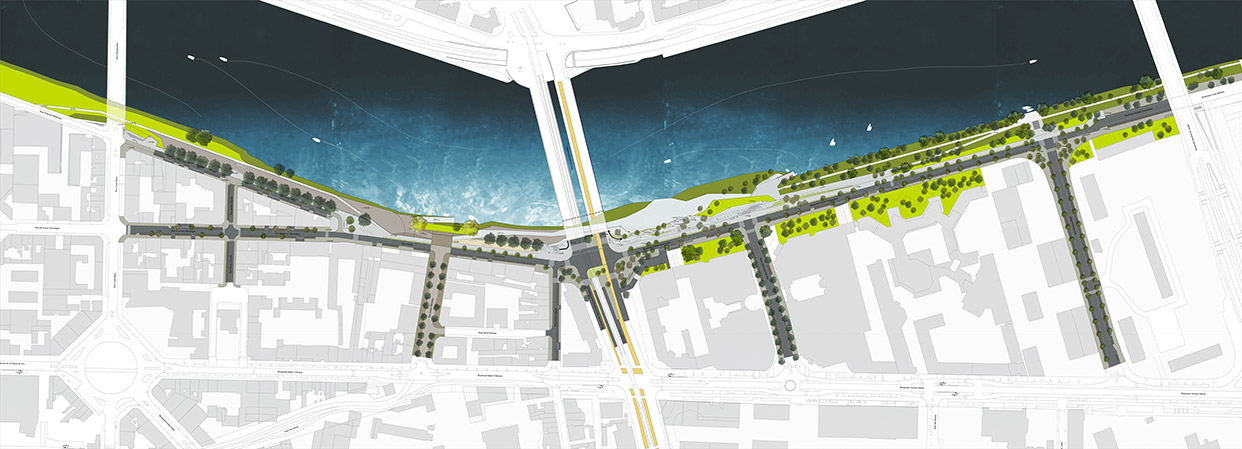






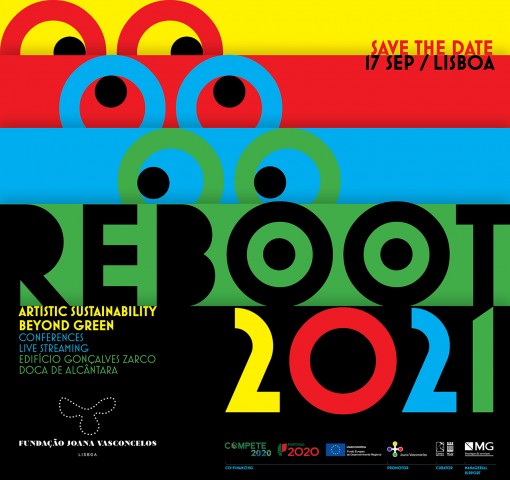


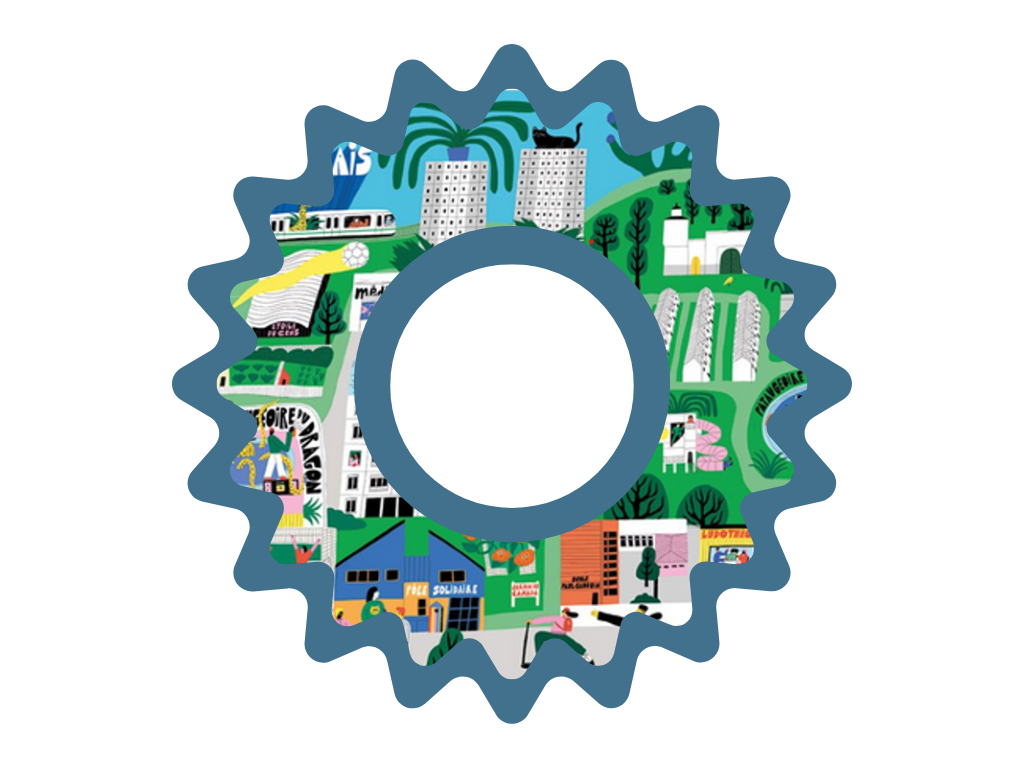












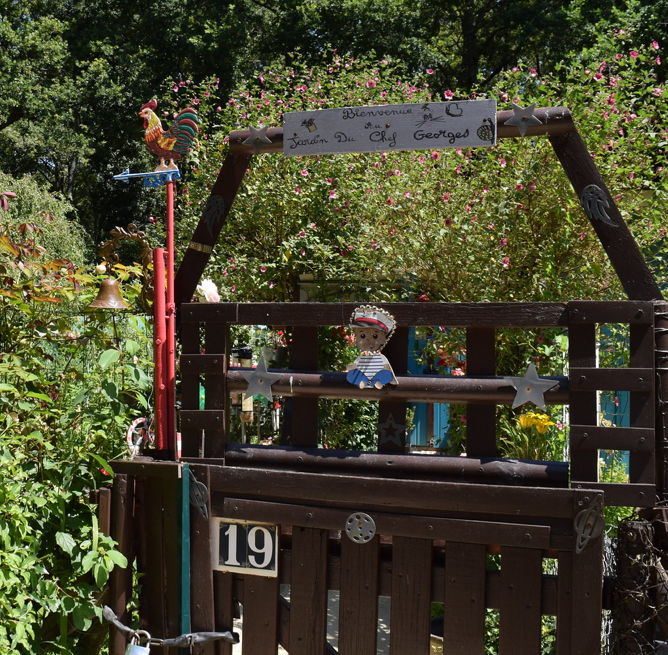


Social & Solidarity Economy